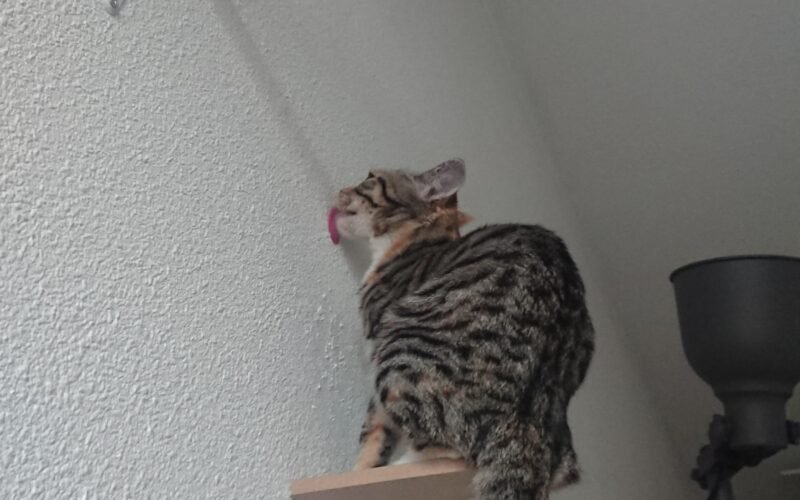Cats usually lick walls due to potential health or behavioral issues. It could be a sign of an underlying illness or nutritional deficiency, or it might be a compulsive behavior triggered by stress, anxiety, or boredom.

If you have a cat who likes to lick the walls, it might leave you wondering why they would do such a thing. It’s natural to feel confused and concerned about your furry friend’s unusual behavior. While it may seem innocuous at first, persistent licking of walls could be indicative of an underlying problem or condition affecting your pet.
In this article, we will explore why cats lick walls and what you can do to ease their anxiety or address their medical needs. We will also examine some myths and misunderstandings surrounding this peculiar kitty behavior. So, whether your cat licks walls only occasionally or does so regularly, read on to learn more and find possible solutions.

Credit: betterwithcats.net
Understanding The Feline Tongue
A cat’s tongue is an amazing and intricate tool that serves many purposes. One of its main uses is for grooming. The tongue is covered in papillae, which are tiny, backward-facing hooks. These hooks act like a comb, removing dirt and debris from their fur.
The tongue also distributes saliva throughout the fur, which helps to keep it clean and hygienic. Additionally, cats use their tongues for social interaction. They will often use their tongue to lick and groom other cats, as a sign of affection and bonding.
Understanding the feline tongue and its anatomical features can give us a deeper insight into our furry friend’s behaviors and needs.
The Reasons Behind Wall Licking
Cats are known for their unusual behavior, and one of them is licking walls. It could potentially indicate an underlying medical problem, like dental issues or mental disturbance. Otherwise, it might be an instinctual habit left over from their wild ancestors in the wild.
Cat owners may also consider changing their feline’s environment or diet to remove the inappropriate behavior. Consulting a veterinary behaviorist may also be helpful in determining the cause of wall-licking. It is essential to determine the root cause of the behavior to address it effectively.
As a cat owner, taking timely action and seeking professional help can help them tackle this problem efficiently and make life for both cat and owner a bit more comfortable.
Medical Conditions That May Cause Wall Licking
Wall licking is a peculiar behavior often observed in cats. It can be an indication of underlying medical problems. Some of the medical conditions that may cause wall-licking in cats include gastrointestinal disorders, dental diseases, neurological problems, and skin allergies.
Cats may also adopt this behavior due to stress or anxiety. As a responsible cat owner, it is essential to consult a veterinarian to determine the cause of wall-licking behavior. The veterinarian can conduct a thorough examination, including blood work, x-rays, or skin tests, and provide appropriate treatment.
Wall-licking should not be ignored as a mere quirk but should be taken seriously as it may be a sign of underlying health issues.
Behavior Modification Techniques To Stop Wall Licking
Cats have unique tendencies, and licking walls is one of them. Behavioral techniques can assist in stopping this habit. Positive reinforcement and redirection are effective techniques. Rewarding the cat for good behavior will reinforce their positive conduct. Redirecting their attention to other forms of stimulation can be helpful in stopping wall licking.
Interactive toys, scratch posts, and food puzzles are ideal. Providing a comfortable sleeping area, social stimulation, and plenty of playtime can keep your cat content and reduce wall licking. It’s possible to break a cat’s habit of wall-licking using these natural techniques.
The Importance Of Creating A Safe And Stimulating Environment For Your Feline Friend
Cats are known for their peculiar behaviors, such as licking walls. It may seem harmless, but it could indicate a lack of mental stimulation. Providing interactive play and puzzle feeders can keep them mentally engaged. Additionally, creating a calm and stress-free environment can reduce anxiety and prevent unwanted behaviors.
Understanding your feline friend’s behavior can help improve their quality of life. By creating a safe and stimulating environment, you can keep your cat happy and healthy.
Frequently Asked Questions
Cats sometimes lick walls due to boredom, anxiety, or curiosity. They might also be attracted to the texture or taste of the walls.
Licking walls can be harmful for cats if the walls are painted with lead-based paint or contain toxic substances. Otherwise, it is harmless for them but might be a sign of an underlying issue.
Providing sufficient mental and physical stimulation, such as interactive toys and playtime, can help stop your cat from licking walls. Consulting with a vet is also recommended to rule out any medical conditions.
Yes, stress can be a reason for your cat licking the wall. If there are any changes in your cat’s environment, such as home renovations or new pet introductions, it could lead to stress and wall-licking.
It is not normal behavior for cats to lick walls frequently. If you notice this behavior in your cat, you should consult a vet to check for any underlying medical or emotional issue.
Conclusion
As we’ve learned in this blog post, cats can lick walls for a variety of reasons. It could be due to stress or anxiety, curiosity, or a symptom of an underlying medical condition. It’s important for cat owners to observe their cat’s behavior and consult with a veterinarian if they notice any abnormal licking habits.
However, if the behavior is simply due to curiosity or boredom, providing your cat with more stimulation and playtime can help redirect their attention. Additionally, providing your cat with a variety of toys and scratching surfaces may also prevent wall licking.
Overall, understanding why your cat may engage in this behavior can ultimately lead to a happier and healthier feline companion.











